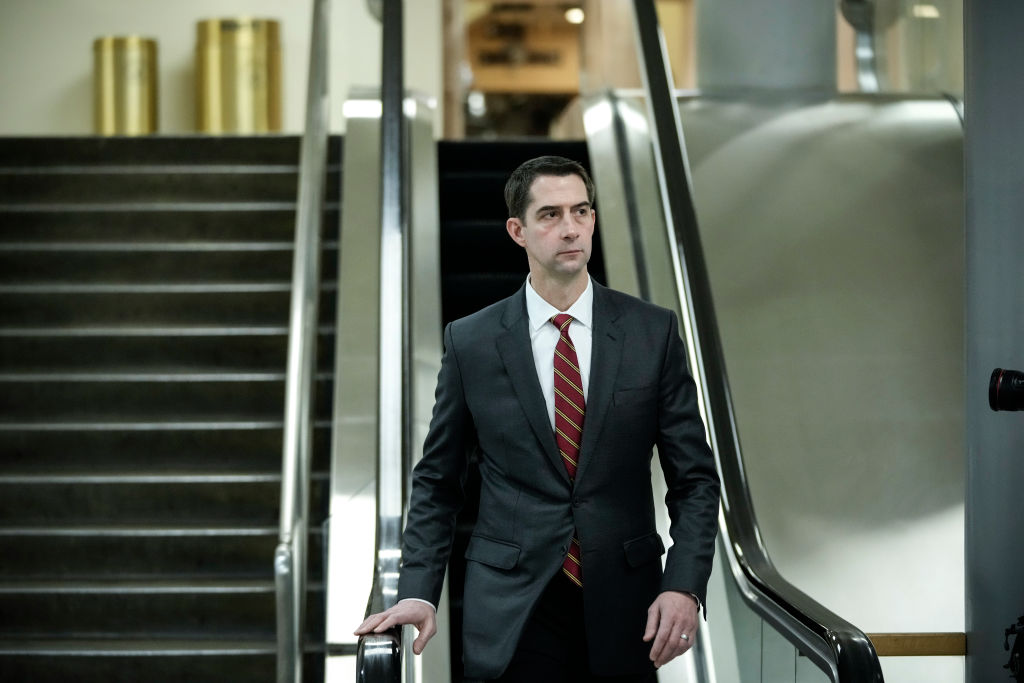Tom Cotton’s time for choosing
On Monday night, Tom Cotton made a pitch not for unity exactly, but for the intellectual coherence of modern Republicanism.
The senator from Arkansas, an outside 2024 contender, used an address at the Ronald Reagan Presidential Library, part of its “Time for Choosing” series of lectures, to identify both Trump and Reagan (and, by extension, himself) with the “Jacksonian” tradition within the GOP.
It’s hard to imagine Cotton — ungainly and no great orator — as the GOP’s presidential nominee. But he is an interesting figure in the party: deeply ideological, hawkish on foreign policy — and yet he’s managed to fold the Trump revolution into his view of the world with a seeming ease that many like-minded conservatives haven’t achieved. (The biggest policy difference between Trump and Cotton during the former’s four years in power was Cotton’s opposition to Trump’s push on criminal justice reform.)
“Some can’t imagine how the same party sent both Ronald Reagan and Donald Trump to the White House,” said Cotton. “They contend that our party must somehow choose between the legacies of these two men. I disagree. For all their differences in temperament and style, there is a deeper continuity in the beliefs of our fortieth and forty-fifth presidents.”
Both presidents, Cotton noted, chose to hang a portrait of Andrew Jackson in the Oval Office when they came to power. But Cotton used Jackson as little more than a device for his big argument about today’s Republican Party: divide? What divide?
To some, Cotton’s “nothing to see here” claims of one big GOP happy family will seem absurd. Just look at the furious row about the 2020 election and Trump’s conduct since. More broadly, to argue for the continuity in modern Republicanism is to wave away Trump’s disruption as little more than a clash of personalities or a slight course correction that kept the party on the straight and narrow.
That is an unconvincing account of recent political history. And yet, the contemporary Republican Party is not nearly as divided as some might have expected after 2016 or 2020. A decisive break-up on the American right has proved elusive, to the relief of GOP operatives and the frustration of their opponents. In policy terms, there is little in today’s mainstream Republican messaging that points to the ructions of recent years. Democrats run Washington and the GOP is delivering a stinging critique that attacks the party in power for: an ever-expanding role for the state, the threat of runaway inflation, progressive identity politics, being soft on crime, and refusing to take voters’ concerns about immigration seriously. Plus ça change.
But scrape the surface of a Republican Party on the same page in opposition and the fault lines grow more obvious. Witness, for example, how a party largely sticking to an all-purpose attack on the president for his weakness feels just days away for a return to a bad-blooded scrap between doves and hawks. Mitch McConnell understands the shallowness of Republican coherence. Hence his firm instructions to colleagues to avoid a substantive policy platform ahead of November.
Republicans may seem unified now, but with ever-intensifying primary contests, the prospect of a return to legislative power in November ending safe, knee-jerk opposition, and then the early stages of a presidential primary following soon after, this might be as good as it gets. In other words, the time for choosing will come sooner than Cotton thinks.
*** Sign up to receive the DC Diary in your inbox on weekdays ***
Kamala to the rescue
In the last twenty-four hours, the United States and Europe’s responses to the Russian invasion of Ukraine have started to meaningfully diverge for the first time in weeks. Joe Biden’s ban on oil imports went further than any European ally. The UK has announced a ban that will only come into full effect by the end of the year, while the EU says it plans to phase out all Russian oil and gas “well before 2030.” Biden, who has prioritized consensus among allies throughout the crisis, faced the likelihood that Congress forced him into a ban and so pre-empted any legislative action.
The gap between the US and EU approaches to Russian energy exports is less surprising than a statement issued by the Polish government yesterday. Having said that they would supply Ukraine with fighter jets, the Poles then announced that it was “ready to deploy — immediately and free of charge — all MiG-29 jets to the Ramstein Air Base and place them at the disposal of the Government of the United States of America.” In other words, Poland has punted the delivery of the jets to the US. That, the Pentagon replied, was not “tenable.” Into this row steps Kamala Harris. The vice president flies to Poland today to try and to diffuse things. What could possibly go wrong?
MbS snubs Biden
Saudi-US relations are, all of a sudden, a lynchpin of Biden’s foreign policy. First, the prospect of a new deal with Iran, Saudi Arabia’s main regional foe, requires a diplomatic charm offensive. Second, the energy crisis sparked by the war in Ukraine means Biden needs Gulf allies more than ever. But according to the Wall Street Journal, US requests for direct talks between Biden and the de facto leaders of Saudi Arabia and the UAE, Mohammed bin Salman and Mohammed bin Zayed Al Nahyan were denied. That would constitute a major snub under any circumstances. The current crisis makes it especially eyebrow-raising.
What you should be reading today
Charles Lipson: Fourteen lessons from the war in Ukraine
Daniel DePetris: Putin the reckless gambler
Alex Perez: Florida’s ‘Don’t Say Gay’ bill plays in to DeSantis’s hands
Niall Ferguson, Bloomberg: The fates of Ukraine and Putin turn on seven forces of history
Kevin D. Williamson, National Review: Biden’s energy-policy bind
Yakov S., American Purpose: Kharkiv diary
Poll watch
President Biden Job Approval
Approve: 41.6 percent
Disapprove: 52.6 percent
Net approval: -11.0 (RCP Average)
Georgia governor — Republican primary
Brian Kemp: 50 percent
David Perdue: 39 percent (Fox)

























